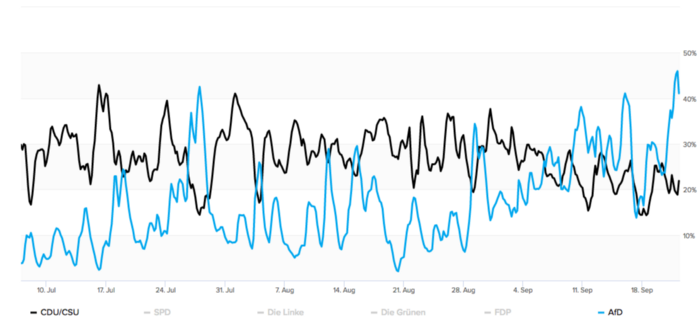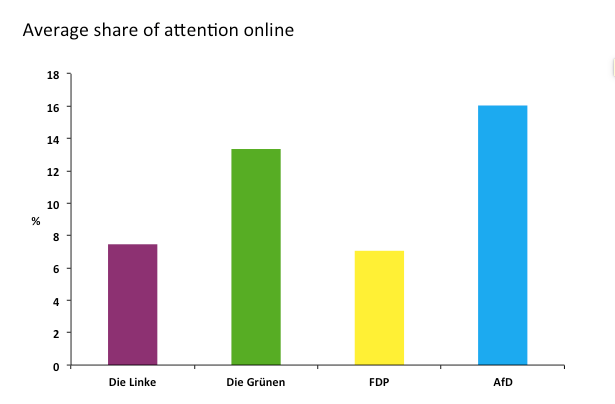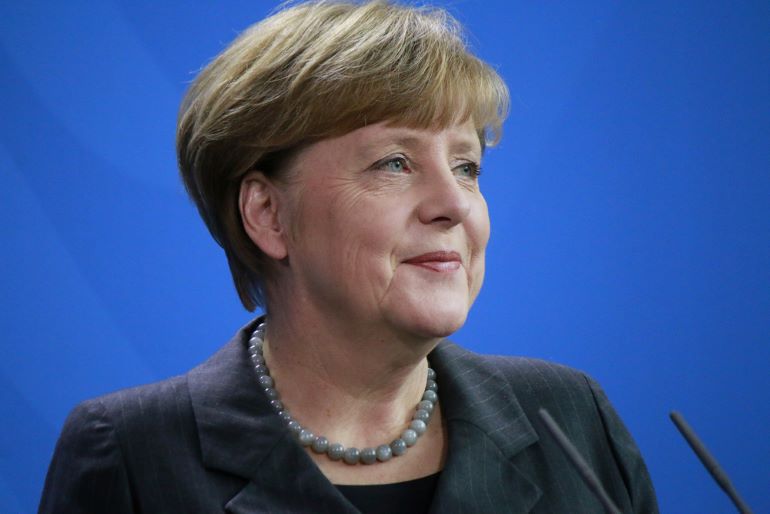There is little doubt that Angela Merkel will emerge victorious from Sunday’s German parliamentary elections. However, our big data model, which correctly predicted the outcome of the French elections in May, suggests that there might be two unwelcome surprises waiting for the woman who has led Germany for over a decade.
The right-wing populist Alternative für Deutschland (AfD), however, has seen a marked increase in attention in September, often dominating the debate, suggesting that it may do better on Sunday than most polls suggest. If this is the case, building a coalition and governing will become much harder for the Chancellor, as a government with a diminished majority faces a large and obstructive opposition.
After our success in predicting the outcome of the French elections in May 2017, our data scientists have again analysed the comprehensive data on online news consumption to which we have access. For over two months, the German Election Tracker (GET) has been tracking how much attention each party has been receiving online from the German public.
Based on this data, we believe that the AfD will enter the Bundestag as the third-largest party, likely with more than 10% of the vote and therefore at the upper end of the range which the latest polls predict.

Initially, it appeared that the AfD was doing quite poorly. Until the end of August and into September, the party was only rarely able to garner the bulk of the attention, unlike similar parties like France’s National Front. In the last few weeks, however, the AfD has been dominating the debate and continues to do so. Conventional polls have now started to pick up growing support for the AfD as well. Our data suggests this trend will continue, making it more likely than not that the party will enter the Bundestag as the third-largest force in German politics.
We also think the FDP may do worse than the polls suggest, making a centre-right CDU/CSU-FDP coalition unlikely. Throughout the entire campaign, the FDP has lagged behind the other parties in the level of attention it received online, averaging at just over 7% (see below). While the last week has seen some more encouraging signs and the nature of the election campaign, where the largest party engaged in a deliberately low-key style of campaigning, makes it difficult to translate levels of attention directly into levels of electoral success, we do believe that the FDP is set for a disappointing performance.

It is almost certain that Merkel’s CDU/CSU will not be able to govern alone, and there is a bewildering array of possible coalitions, from a continuation of the CDU/CSU-SPD grand coalition and a traditional centre-right CDU/CSU-FDP coalition to an as yet untested alliance of CDU/CSU, FDP and the Greens. Even a CDU/CSU minority government is a possibility.
It is clear that a poor performance of the FDP would make coalition-building harder for Angela Merkel. Perhaps the biggest question of Sunday will be whether the right-wing populist AfD party emerges as the third-largest force in German politics. Based on our data, it certainly looks like it will — suggesting that German politics is about to get a lot more fractious.



